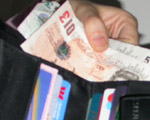 Go to main content
Go to main content
Archive Website of the UK government
Please note that this website has a UK government accesskeys system.
Main menu
Page menu
Crime and justice

Fraud

Fraud happens when somebody lies to you or deceives you in order to cause you harm, usually by costing you money. Millions of people fall victim every year. Find out what you can do to stay safe from fraud.
What is fraud?
Fraud is a complex kind of theft. Fraud is sometimes called a 'confidence game' or a 'con'.
You can be defrauded if somebody steals your credit card, and uses it to buy things, or if someone hacks into your bank account and takes the money. Other types of fraud include fake investment projects, when you give money for something that never happens. And identity fraud, when somebody pretends to be you in order to buy things that they never intend to pay for.
Find out more about all of these types of fraud below.
The cost of fraud
Fraud costs the country at least £14 billion each year; nearly £265 for every person.
While credit card companies and banks pay for most of this, being a victim of fraud is frightening, and can damage your credit rating.
The human cost is even higher. If you are defrauded, the money made from that fraud could well be poured into organised crime gangs, and used to fund more serious crimes such as drug smuggling and people trafficking.
Identity theft
Identity theft (sometimes called ‘identity fraud’) is when information about you (such as your name, National Insurance number, and address) are stolen and used by somebody else to get credit or cash illegally.
You might not find out this has happened to you until your credit report shows credit cards you do not have, or if you receive bills for accounts that you do not own.
If you think you have been the victim of identity theft, you should take action right away. If debit or credit cards, online banking or cheques are involved, your first step should be to contact your bank or credit card company.
They may then ask you to report the crime to your local police station.
Investment fraud
Fraudsters will use many ways of persuading you to give them your money for bogus investments. These can be anything from fake shares to pyramid schemes to 'exclusive' holiday clubs or timeshares.
These schemes will usually seem too good to be true and they almost certainly are. They could cost you a great deal of money and you’ll probably receive very little or nothing in return.
Credit card and payment fraud
These common frauds usually involve stealing or copying (‘cloning’) your card or stealing your pin-code to access your account.
Unfortunately, if somebody has cloned your card, it could take some time before you notice something is wrong. Many people don't discover the crime until they receive their bank or card statements.
As soon as you notice your cards have been stolen or used illegally, report it to your bank or credit card company. They may ask you to file a police report.
Consumer fraud
Fraudsters have many ways of tricking you into paying for goods that turn out to be worth much less than you paid – or non-existent.
From miracle cures that don't work, to phony phones you never receive, to doorstep salesmen pressuring you into buying a worthless gadget you don’t want. Fraudsters will try every trick in the book.
Find out more about these and other frauds on the Consumer Direct, Identity Theft and Be Card Smart websites.
Protect yourself from fraud
Here are a few simple steps you can take to avoid becoming a victim of fraud:
- be alert when using your debit card or credit card; make sure nobody stands close enough to see your pin-code
- don’t keep your pin-code written down in the same place you keep your cards
- don’t send money in response to unrequested letters, emails or phone calls
- shred or burn any documents that have your name, address, and other personal information
Find out more about staying safe from fraud by visiting the Cardwatch, Banksafe Online, or Metropolitan Police fraud alert websites.
Reporting fraud
Tell your bank
If debit or credit cards, online banking or cheques are involved in the fraud, your first step should be to contact your bank or credit card company.
They may then ask you to report the crime directly to your local police station.
Contact Action Fraud
If you think you’ve been a victim of fraud, or you fear somebody is trying to defraud you, contact Action Fraud at the National Fraud Reporting Centre. Staff there will help you get the support you need so you can deal with what’s happened to you.
By contacting them, you’ll be giving anti-fraud agencies vital information that they need to protect you and others from criminals. At the same time you could also help to bring the offenders to justice.
Action Fraud refers all cases of fraud to the National Fraud Intelligence Bureau. Although each report cannot be investigated, the information will help the police build up a picture of who is committing what fraud. This will help them to stop the fraudsters and keep other potential victims safe.
To contact them, call 0300 123 2040 or Textphone 0300 123 2050. The centre is open for calls Monday to Friday between 8.00 am and 8.00 pm, Saturday from 9.00 am to 6.00 pm, and Sunday from 10.00 am to 4.00 pm.
 Facebook
Facebook Twitter
Twitter StumbleUpon
StumbleUpon Delicious
Delicious Reddit
Reddit